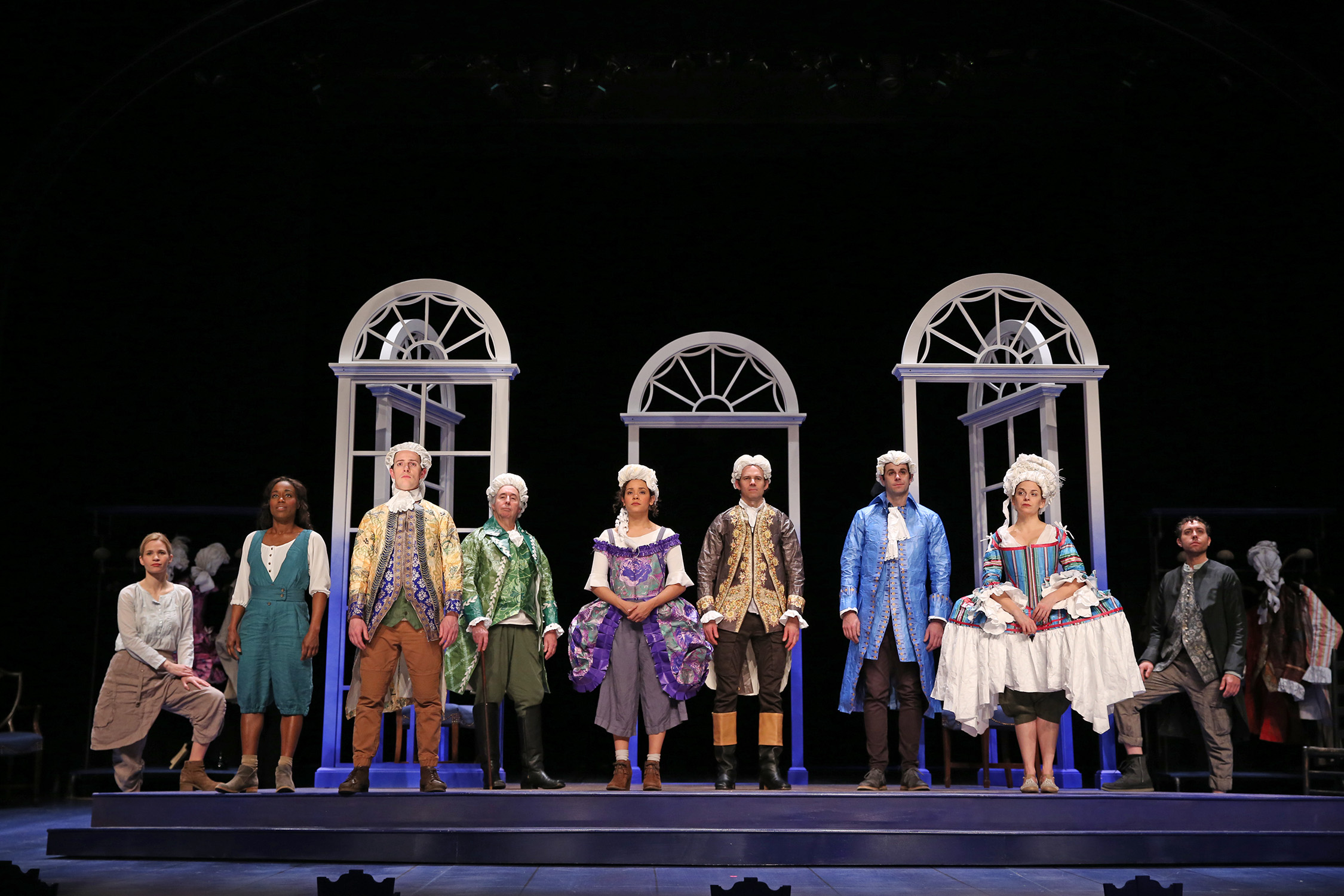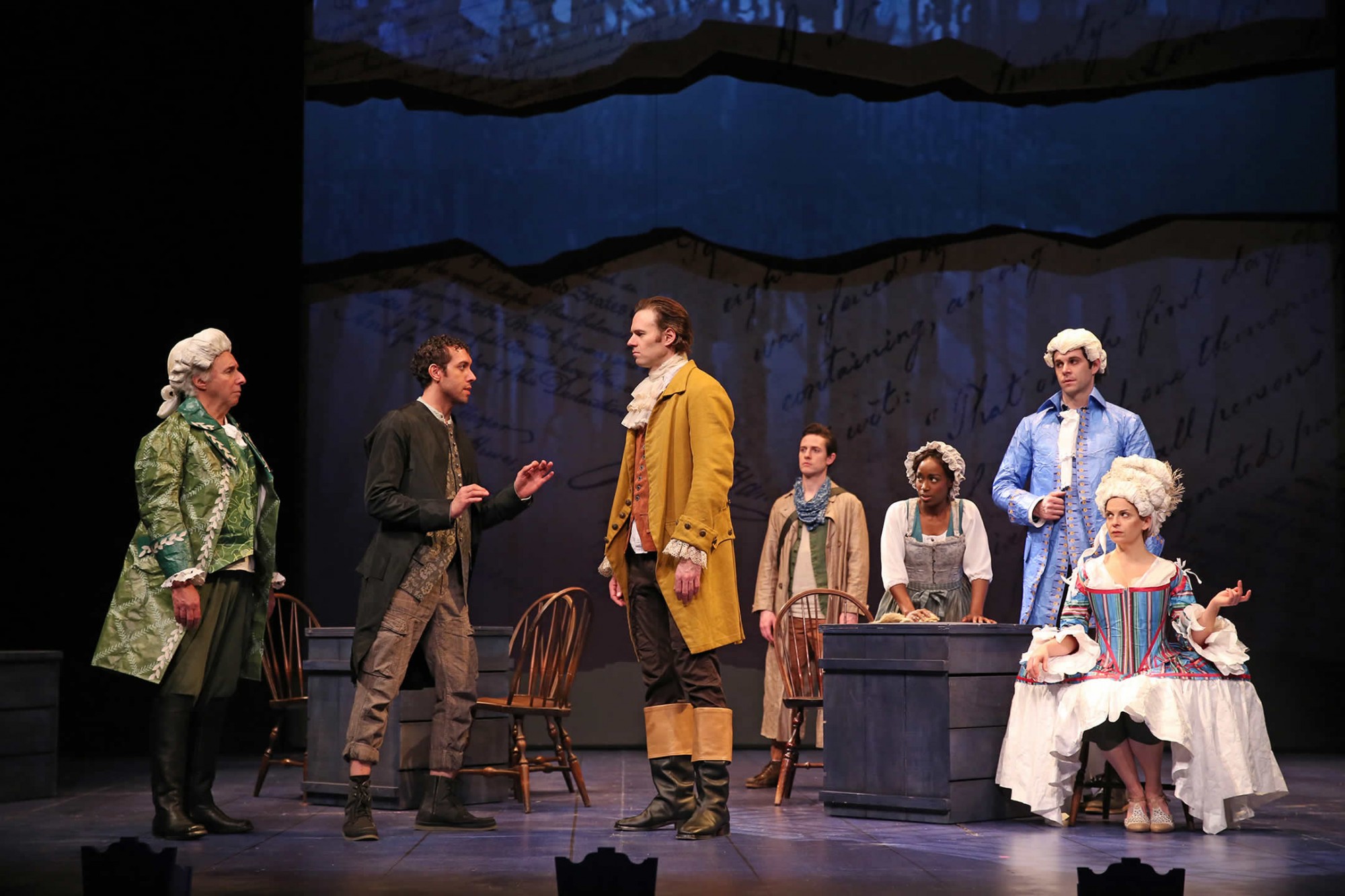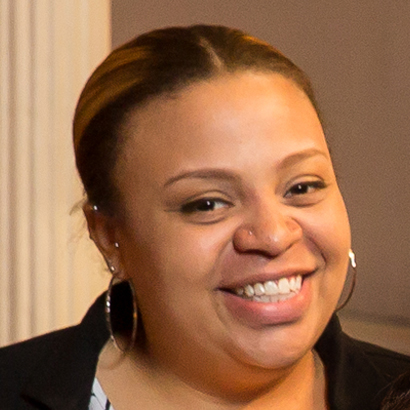
Meet the Characters of Jefferson’s Garden by Timberlake Wertenbaker
Jefferson’s Garden is a historical fiction play featuring fictional characters created by playwright Timberlake Wertenbaker as well as real figures pulled from the pages of history.
The Ford’s production of Jefferson’s Garden features nine actors in the show’s many roles. A handful of the cast play multiple characters during the course of the story. For example, at different times, actress Maggie Wilder plays the sister of the main character, a member of the Historical Chorus, Patrick Henry and others.

Casting actors in dual roles is not uncommon in theatre. In this particular play, it helps highlight the universality of the human experience and our common humanity. Read more about dual casting here.
At the heart of Wertenbaker’s story are several of her fictional characters…
The Historical Chorus
At the opening of the play, a group of performers addresses the audience: “We have to ask you to be gender-blind, color-blind, age-blind, shape-blind, but in all other ways perceptive.” The Chorus members appear throughout the play as omniscient narrators—a theatrical device made popular in early Greek theatre. The chorus speaks as one voice but through many mouths.
Quaker Family: Daniel, Martha, Louisa, Carl Christian, Christian and Imogen
Historically, English Quakers (also called the Society of Friends) faced persecution for many reasons including refusing to tithe to the Church of England and refusing to engage in combat. By 1680, more than 10,000 Quakers were imprisoned in England and 243 had died from torture and mistreatment in the King’s jails. This reign of terror impelled Friends to seek refuge in colonial America. However, they weren’t always warmly welcomed, and the Quakers were expelled from some states, including Virginia, forcing many to settle in Southern Maryland.
Christian

The protagonist in the play is a young Quaker named Christian who decides to split from his family’s pacifist beliefs and join the fight for American independence. As a Quaker, Christian believes that every person—male or female; enslaved or free—is of equal value. Historically speaking, Quakers were divided on whether to participate in the Revolutionary War. Many Quakers were merchants who tried to peacefully petition the British king against tyranny and excessive taxation. As war drew nearer, and war and violence seemed imminent, most Quakers maintained a commitment to pacifism. Others left the fold and formed the Free Quakers in order to fight for freedom.
A shoemaker by trade, Christian travels from his Maryland home to Williamsburg, Virginia, with the army; then on to Philadelphia, Pennsylvania, and eventually to Charlottesville, Virginia. Along the way, he becomes enchanted by Thomas Jefferson’s vision of freedom. But Christian becomes disillusioned as he realizes that America’s founders will compromise on the idea of freedom for all people to guarantee freedom from the British crown.

Susannah
The character Susannah was born a slave. At the time of the American Revolution, there were 450,000 enslaved African Americans within the 13 colonies. In November 1775, Virginia’s last British governor, Lord Dunmore, promised freedom to any enslaved people who joined British forces. During the play, Susannah decides to fight for the British, disguised as a man, since women were not permitted to fight. When Susannah is injured in battle, she leaves the army and moves north to escape enslavement. Later, Christian discovers her living in Philadelphia and the two have a relationship.

Betty
An heiress, the fictional character Betty accompanies Nelly Rose on many of her visits to Thomas Jefferson’s Monticello. There she meets Christian. Betty’s family has greatly benefitted from the institution of slavery, and their wealth is from owning land and humans.
Christian, Susannah and other fictional characters encounter familiar historical figures in the play, including:
Thomas Jefferson
- Jefferson was the third President of the United States (1801-1809). He famously authored the Declaration of Independence and Notes on the State of Virginia.
- Jefferson spent much of the American Revolution in Paris, France, where he negotiated that country’s assistance in the Americans’ fight for independence.
- Jefferson was owner of the Monticello estate and plantation and more than 600 enslaved people during his lifetime.
- Jefferson also was founder of the University of Virginia, which he could see from his hilltop Monticello.
Nelly Rose
Nelly Conway Madison, or Nelly Rose, is the mother of James Madison. The real Nelly lived to the age of 98. In Wertenbaker’s play, Nelly Rose often sits in during talks about shaping the new country with Jefferson, Mason, Christian and Madison and shares her own input. She is very talkative and tries to arrange a marriage between Christian and a young heiress named Betty.
Sally and James Hemings

- Young enslaved siblings Sally and James Hemings served Thomas Jefferson in different roles, including personal assistant, chef, chambermaid and nursemaid to his daughters.
- The two shared a father, John Wayles, with Jefferson’s wife, Martha.
- Biological evidence confirms historical claims that Thomas Jefferson very likely fathered Sally’s six children.
- •There are no known accurate pictorial depictions of Sally or James Hemings.

James Madison
- James Madison was the fourth President of the United States (1809-1817).
- He is nicknamed “Father of the Constitution” for his early drafts of the document
- Madison notably used his political platform to fight for religious freedoms.
George Mason
- George Mason wrote the first draft of the Virginia Declaration of Rights and designed the official Commonwealth seal. Mason’s Virginia Declaration of Rights served as the basis for the United States Bill of Rights.
- Mason was one of three delegates who refused to sign the United States Constitution because he believed it failed to establish a wise and just government. He argued that the Constitution needed to include a bill of rights to divide the newly forming government’s power more evenly among constituents and avoid the development of a monarchy.
Erika Scott is Artistic Programming Manager and Washington Metro-area native. Follow her on twitter at @Musiqal_onE.
Lauren Beyea is Associate Director of Communications and Marketing. She is editor of the Ford’s Theatre Blog. Follow her on Twitter @LaurenBeyea.

